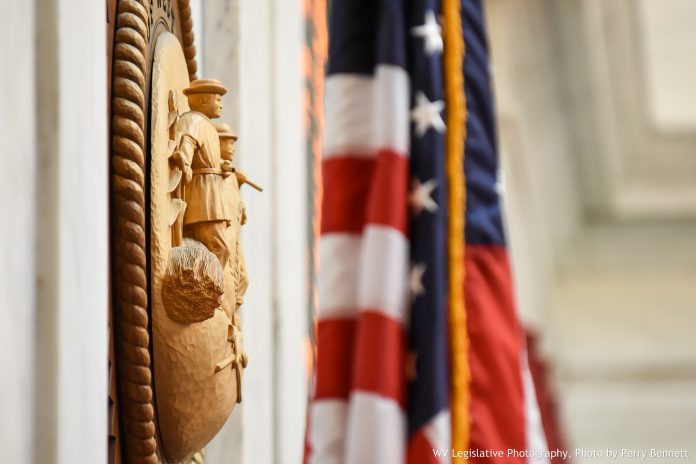
When Virginia Link graduated nursing school from the McMillan Hospital School of Nursing in Charleston in April of 1942, she may not have known the life she was soon to lead. Link was eager to become a nursing instructor after graduation, but instead she joined the Army Nurse Corps in July 1942.
After Link received her training at Fort Knox, she volunteered for overseas duty and was soon deployed to Northern Africa to serve as a World War II nurse. As one of 233,985 West Virginians to serve in World War II, Link died in an automobile accident in September of 1943 defending America’s freedom on foreign shores.
Virginia Link’s sacrifice epitomizes a proud state that, per capita, has had more citizens serve in the Armed Forces than any other and one that is home to five veterans’ affairs (VA) hospitals, seven VA clinics, eight special programs, a veterans’ nursing home and a Veterans’ Council. Each year, this brave and noble sector of society known as veterans is honored by the Legislature. This session, February 19 was deemed Veterans’ Visibility Day by the Senate and House under separate resolutions.
Over the years, the West Virginia Legislature has created many laws to improve the welfare of veterans. Five veterans’ bonus amendments to the state constitution have been ratified over the years, highlighting the importantance of recognition and compensation for those who served our country in times of war.
West Virginia has 58,053 World War I veterans and 233,985 World War II veterans. Ratified in 1950, the first Veterans Bonus Amendment provided a bonus for veterans who served in either of the World Wars. A veteran serving in the continental United States could receive $10 for each month served, those serving abroad could receive $15 per month served.
West Virginians have been able to receive bonuses for serving in other wars too. The state had approximately 112,000 residents that served in the Korean Conflict and 36,000 that served in the Vietnam War. The Legislature has created veterans bonuses for those wars as well.
The only bonus that can still be claimed is the Veterans Bonus Amendment for Kosovo, Afghanistan and Iraq, which was ratified in 2004. Certain time periods apply for this bonus, but this amendment applies to anyone who served on active duty during those periods. However, for Kosovo and Afghanistan, a veteran must have received a campaign badge or expeditionary medal for his or her service. The veteran receiving the bonus must have been a resident of West Virginia for at least six months prior to enlisting and must have been honorably discharged from service. The bonus is $600 for veterans inside the combat zone. Veterans who did not serve inside the combat zone in Iraq and Afghanistan are eligible for a $400 bonus. The bonuses are limited to one per person.
Legislative assistance for state veterans has stretched beyond these bonus amendments. In 2005, there was a growing difficulty to find someone to play “Taps” at military funerals. Many groups, such as the Veterans of Foreign Wars, the American Legion and Buglers Across America, agreed it was a problem across the state and the nation. In response, the Legislature passed House Bill 2286, which serves as an incentive for students to assist with “Taps”. Now students are being encouraged to learn to play “Taps” and in return receive community service credit for playing at military funerals.
Due to the large number of veterans in West Virginia, a quality veterans’ nursing home was crucial to provide nursing care to those who had served. During the 74th Legislative Session, Senate Bill 1005 was passed to authorize the sale of revenue bonds so the state could fund 35 percent of shared construction costs for a veterans’ nursing home. A lottery scratch-off game also was created to fund a portion of the nursing home. Located in Clarksburg, the nursing home broke ground in 2003. The construction of the building is complete and is currently in the final stages of inspection.
While bills and bonus amendments were passed to give thanks to the men and women who bravely served our country, the value of our Armed Forces goes beyond mere monetary expression. Serving and having served in conflicts past and present, these men and women have made sacrifices for our country that are sometimes taken for granted. However, our service persons’ greatest contribution is that they afford the rest of us the luxury of living lives free of the troubles they struggled to eradicate, a noble endevour worthy of recognition. That is why, beyond the financial support offered or the holidays celebrated, perhaps the greater thanks is to let these awards of merit and bravery act not as ends in themselves, but instead as continued reminders that, without what they have done, we very well might not be able to carry on what we do.

